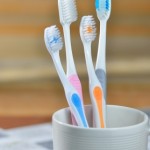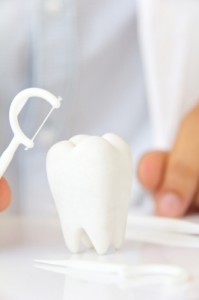Forgetting to brush your teeth in the midst of a busy day can be easy, although we hate to admit that we’ve all done it before! Skipping a brush session here and there seems harmless at the time, but later down the road it can have some serious side effects. Follow these eight simple tips to ensure your pearly whites remain healthy well into your later years.
Establish a Routine
Dentists recommend two important times for a good brushing: once at night before bed and once in the morning after you wake up. Brushing before going to bed is critical in cleaning your saliva free of the day’s bacteria. Brushing when you wake up is important to remove pesky morning-breath and bacteria. To help remember these times, we invite you to correlate your brushings with pajama changes, so you’ll always hit the two times a day mark with little to no interruptions.
SET A ROUTINE EARLY: Why Kids Need to Practice Good Oral Hygiene
Brushing Technique
Did you know there are right and wrong ways to brush? Hold your brush with a loose fist and your thumb on the grip provided by the brush. Tilt the brush on a 45 degree and use a circular motion, not back and forth motion, to guarantee all-over coverage. Remember to go at it for at least two minutes, spending roughly 20 seconds on each spot before moving on to the next group of teeth.
Choose the Right Brush
Choosing the right brush can affect the lifespan of your enamel. Go for a brush with soft or ultra-soft bristles to minimize scraping on your teeth and gum-line. A gentler brush will reduce gum recession whereas a stiff brush may wear away enamel. A spinbrush is a good choice for those with limited physical abilities, plus the higher speeds and motions mirror the tools used in a dentist office.
RELATED: When Should You Replace a Brush
Choose the Right Toothpaste
Almost as important as choosing the right brush, choosing the right toothpaste can mean the difference between pain and comfort. Some toothpastes contain whitening properties that leave teeth feeling sensitive and sore. If you start to feel pain during meals or when your teeth are exposed to the cold, change your toothpaste immediately. Check for toothpastes with fluoride, the best way to keep teeth clean and white with no pain.
Drink Beverages Through a Straw
It’s no secret that sugary beverages will soften your enamel, but some drinks will go as far as staining your teeth. Minimize the amount of time these drinks spend in your mouth by drinking through a straw. As a bonus tip, eat an apple after sipping on teeth-staining beverage to take advantage of the fruit’s natural absorption quality.
 Floss, Floss, Floss
Floss, Floss, Floss
You know the dentist is going to ask! Give a good report by learning how to floss without a mirror. Contrary to popular belief, you don’t really need to see what you’re doing as long as you can feel each tooth getting a good floss. Now you can quickly floss before a meeting, while in bed and even in your car (once it’s parked, of course).
SEE ALSO: Why Flossing is So Important
Good Teeth Come From a Good Diet
They say you are what you eat, and that couldn’t be more true than in the case of building your teeth. A diet full of calcium and vitamin D will help strengthen your bones and teeth, including your jaw bone where your teeth are housed. Yogurt, cheese and kale are filled with calcium while salmon, soy milk and egg yolks contain vitamin D. Make sure to drink a lot of water to replenish your saliva levels throughout the day to avoid tooth decay.
Don’t Forget About Your Tongue!
These tips for healthier teeth are only as good as a clean mouth. Your tongue collects myriad bacteria throughout the day and night that need constant eradicating. Invest in a tongue scraper and use it as often as you brush. Avoid using your toothbrush as a tongue scraper as this will only move the bacteria from your tongue to your brush and teeth. A tongue scraper prevents bacteria from building up and causing bad breath.

